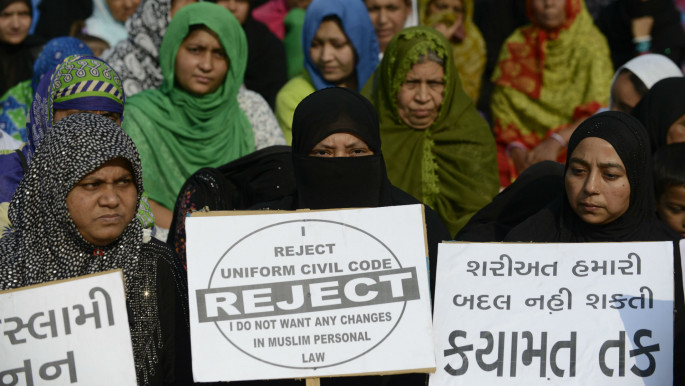India's supreme court strikes down 'instant Islamic triple divorce'
The practice, which opponents have long said is not sanctioned by the Quran, allows Muslim men to divorce their wives by simply repeating the word "talaq" - "divorce" in Arabic - three times. This option is not open to wives, who are traditionally required to seek divorce through mutual agreement or judicial petition.
It was found to be a violation of Article 14 of the Indian Constitution, which provides for equality before the law.
The ruling followed the petitions of five Muslim women who had experienced triple talaq divorces, and said that the practice violated their fundamental rights.
Fewer than one percent of divorces between Muslim couples are understood to be "triple talaq" cases.
An 'historic' victory
Rights groups who backed the petitions lauded the verdict as an "historic" victory, and were joined by India's Hindu nationalist Prime Minister Narendra Modi in celebrating the decision.
Twitter Post
|
"Judgment of the Hon'ble SC on Triple Talaq is historic. It grants equality to Muslim women and is a powerful measure for women empowerment," Modi tweeted on Tuesday.
The court's five-member bench was divided 3-2, with the two minority opinion judges arguing that a six-month ban on the practice should be enforced to allow time for new legislation to be introduced.
The majority opinion held that triple talaq "is not integral to religious practice and violates constitutional morality".
Twitter Post
|
In making the decision, supreme court justices cited the fact that triple talaq was already banned in several Muslim-majority countries, including neighbouring Pakistan and Bangladesh.
A personal matter?
During court hearings, opposition to a ban was voiced by the All India Muslim Personal Law Board, who argued that provisions could be made to make the practice more equitable.
It also said that talaq was a personal matter and not one to be judged against the constitution.
 |
|
| Supporters of triple talaq argue that the matter is a personal issue [AFP] |
The AIMPLB has said it will deliberate before issuing a statement on Tuesday's verdict, which it said will have "wide ramifications" on the religious liberties of minority groups.
"[The] court order has affected the rights of religious minority to practice their religion," said Kamaal Farooqui, AIMPLB executive member.
"It will be having wide ramifications... Our feeling is that the judgment does not follow the constitutional guarantees," he added.
A thorny issue
Across the Muslim world, triple talaq has proven to be a thorny issue that has brought religious leaders to loggerheads with government over the limits of state legislators interpreting so-called religious rulings.
Earlier this year, Egyptian President Abdel Fattah al-Sisi suggested that legislation be introduced to nullify triple talaq in Egypt.
The country's top religious authority, the al-Azhar university, cautiously pushed back against the president's suggestion and upheld the validity of the practice.
Al-Azhar's rare intervention against the president demonstrated the strong resistance among state-appointed clerics to preserve the centuries-old practice.




 Follow the Middle East's top stories in English at The New Arab on Google News
Follow the Middle East's top stories in English at The New Arab on Google News


